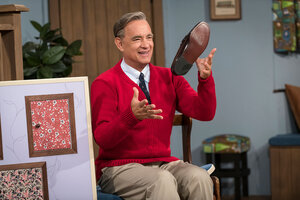Making good look good: Films that transcend stereotypes

Tom Hanks as Mister Rogers in a scene from "A Beautiful Day In the Neighborhood," in theaters Nov. 22.
Lacey Terrell/Sony-Tristar Pictures/AP
Toronto
Sometimes you need a life raft in a storm. Looking back on the more than 300 movies screened at the recent Toronto International Film Festival, the most burningly divisive were the controversial satire “Jojo Rabbit,” featuring Hitler as a 10-year-old German boy’s imaginary friend, and the very dark “Joker,” starring Joaquin Phoenix in an origin story about Batman’s nemesis.
All that high-intensity badness made me hungry for some prominently showcased goodness. I found it, in varying degrees, in at least four of the 20 movies I saw in Toronto: “A Beautiful Day in the Neighborhood,” “Just Mercy,” “The Two Popes,” and “Varda By Agnès.” (All of these movies will be released theatrically by the end of the year.)
I must admit that when I first heard about “A Beautiful Day in the Neighborhood,” I didn’t relish putting myself through a biopic about Fred Rogers, even one starring Tom Hanks. We already had a wonderful documentary, Morgan Neville’s “Won’t You Be My Neighbor,” that canvassed that neighborhood.
Why We Wrote This
Can goodness ever shine as brightly as badness in movies? Our critic shares several films he used as a life raft in a sea of dark offerings at the Toronto International Film Festival.
But the filmmakers – director Marielle Heller and screenwriters Micah Fitzerman-Blue and Noah Harpster – do something very canny. The film’s focus is not Mister Rogers, it’s Lloyd Vogel (Matthew Rhys), a magazine writer notorious for his dirt-digging investigative pieces, who reluctantly accepts an assignment to profile the public TV icon for Esquire magazine. (Vogel is based on real-life journalist Tom Junod.) Vogel is a new dad who has a fraught relationship with his abusive father (Chris Cooper). The movie is about how Rogers, by his words and his example, undoes the writer’s cynicism and heals his wounds.
Now goodness is extremely difficult to portray convincingly in the movies. Or in literature, for that matter – the villains in the novels of Dickens, for example, are almost always juicier than his paragons of virtue. Any actor will tell you that he would much rather play a bad guy than a good guy. Goodness can seem wan and insubstantial and uncomprehending of the dark dungeons of life. But what if the goodness on display acknowledged that darkness and bursts through anyway? Might not the strength of that radiance be doubly valued?
Something like this happens in “A Beautiful Day in the Neighborhood.” The audience is initially placed in the same position as Vogel. We can’t quite believe – even though we might want to – that Rogers is as humane as he comes across. But Mister Rogers isn’t merely disarming in his encounters with Vogel; he is beneficent in a way that seems to come from deep inside. Hanks and the filmmakers do not portray Rogers as a saint. If they did, we would not buy it. He is a human being with an unshakable belief in the sacredness of every individual, large or small. The movie’s standout achievement is that it makes this belief seem not only believable but necessary.
Of course, good messaging does not always make for a good movie. “Just Mercy” is about the Harvard-educated real-life
lawyer Bryan Stevenson, whose decadeslong career has entailed getting unjustly convicted prisoners in Alabama, most of them poor and black, off death row. Stevenson is portrayed in the movie by Michael B. Jordan, a dynamic actor who tamps down his vitality here. As portrayed in the film, Stevenson’s goodness is worthy and righteous but also a bit boring. His rectitude doesn’t have enough psychological levels. He is, in the end, no Atticus Finch. It is Jamie Foxx’s Walter McMillian, as the convict Stevenson rescues, along with McMillian’s extended family and friends, who provide the film’s true transcendence.
As a master class in acting, I enjoyed “The Two Popes,” which is structured as a series of imagined conversations in 2012 and 2013 between then-Pope Benedict XVI, played by Anthony Hopkins, and his eventual successor, Cardinal Jorge Bergoglio, played by Jonathan Pryce. Polar opposites in many ways both personal and doctrinal, these very human eminences bond over soccer and ABBA songs. Hokey, yes, but, to quote the film’s director, Fernando Meirelles, “What I like is this idea of two guys who [at first] didn’t like each other but had to learn to listen. That was tolerance. Nowadays we don’t like to hear people with whom we disagree; we prefer to kill them.”
The Toronto movie with the greatest glow for me was Agnès Varda’s final film, “Varda by Agnès,” a documentary completed shortly before her death in March. She conducts a playful guided tour through her marvelously variegated seven-decadeslong career as filmmaker, photographer, and creator of art installations – like the “cinema shack” she created out of hanging strips of celluloid from one of her early movies.
What comes through most in this film is Varda’s great gift for communion. Even if you have never heard of her, the experience of watching this movie is like reconnecting with an old friend. The feeling she engenders is a tribute to her intense curiosity and her compassion for humanity in all its wayward permutations.
She tells us in the film, “Nothing is trite if you film people with empathy and love.” Her final film testifies to that. What a fitting valedictory it is.
